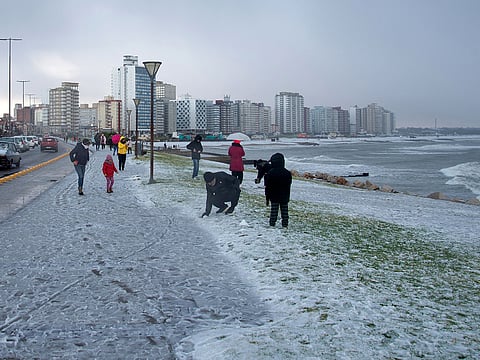Why is it so cold in Argentina, Chile, and Uruguay?
15 deaths reported as polar air mass disrupts daily life

A historic cold snap has swept across the Southern Cone of South America, bringing record-low temperatures, snowfall in unexpected places, and at least 15 reported deaths. The polar air mass — originating from Antarctica — has disrupted daily life in Argentina, Chile, and Uruguay, forcing emergency measures like gas rationing and shelter activation. Here’s what you need to know about the cold wave and why it’s happening.
What exactly is happening?
A powerful polar air mass escaped from Antarctica and moved northward, plunging temperatures across southern South America. Cities unaccustomed to such cold are now experiencing record-breaking lows, snowfall, and energy disruptions.
Which areas are worst affected?
Argentina: Buenos Aires hit -1.9°C, its coldest since 1991. Snow fell in Miramar for the first time in 34 years. Maquinchao in the south recorded -18°C.
Uruguay: The capital Montevideo saw its lowest daytime high since 1967 at 5.8°C.
Chile: Chillan, south of Santiago, hit -9.3°C. Snow even fell in the Atacama Desert, the driest place on Earth.
How are governments responding?
Argentina: Suspended gas supply to industries and petrol stations to prioritise households. Price controls on gas cylinders were lifted to meet demand.
Uruguay: Declared a nationwide “red alert”, allowing forced relocation of homeless individuals to shelters.
Chile: Activated emergency shelter programs for the homeless.
What’s the human toll so far?
At least 15 people have died due to the cold — nine in Argentina and six in Uruguay, mostly among homeless populations.
Is this linked to climate change?
Possibly. Experts say such unusual and intense cold events in warmer latitudes may be tied to climate anomalies. Meteorologist Arnaldo Zúñiga says the reach of this polar air mass is “not common” and cannot rule out climate change as a factor.
Climatologist Raúl Cordero also noted that while cold waves are rare, heatwaves are becoming more frequent, with their global occurrence tripling in recent years.
Is there any relief in sight?
Yes. Temperatures are rebounding:
Buenos Aires: up to 12°C
Montevideo: 14°C
Santiago: nearly 25°C
But the sudden shift from freezing to mild has left many surprised and unprepared.
- with inputs from AFP



